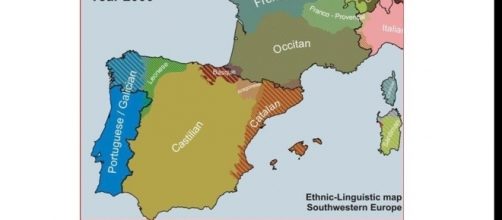As Catalonia's independence is tossed through the air like a beach ball in the halls of politics, I'm sure I'm not the only one wishing I knew a bit more about the almost-nation. Who are the Catalans? Why do they identify as such a separate entity to Spain? Well, for a start, they have their own Language, also called Catalan, which is used by over 4 million native speakers and spoken as a second language by more than twice that number.
Repression under Franco
The Catalan language has a hugely political history. During Francisco Franco's dictatorship, which lasted nearly 40 years, the language was prohibited and lost a great deal of prestige, with Spanish, the 'language of the empire', becoming the norm.
Catalan music was likewise prohibited as Franco attempted to repress regional cultures and identities in order to create a unified state. The injustice felt by Catalans and other minorities actually helped to preserve their cultures. In the late 60s and early 70s, the Catalan musician Raimon led the Nova Cançó ('New Song') movement, epitomised through his aptly-named album, 'Catalonian Protest Songs'. This is as good a place to start as any: Songs are sung in Catalan, reinforcing the region's identity, and calling for political revolution. To speak in Catalan was to resist; to sing on Catalan was to revolt.
Democratic Spain
When Franco's reign ended and democracy was restored to Spain, Catalonia wasted no time in restoring Catalan as its official language.
Having been fierce, if secretly, preserved for four decades, the language came back with a vengeance. Catalan pride was restored through language, making it central to the region's identity. School lessons are still taught almost entirely in Catalan and the language has become one not of 'historical value', as in some minorities, but of living heritage and - as proven beyond doubt this year - modern relevance.
Rumba Catalana
A rumba movement ignited in the 60s by artists like Peret and still going strong today. Below: possibly the most entertaining slice of cultural history you'll see all week.
...And the modern manifestation of these semi-biblical roots:
Rock català
Possibly the only 20th-century example of a government offering grants to rock bands.
Not only that, but the uncoolness of government sponsorship failed to stop it becoming a full-scale movement that thrived from the late 80s right through to the tail-end of the 90s.
Bringin' it into the 21st Century
Catalan is now pervasive in a huge number of modern musical genres as Catalonia asserts itself as a region capable of reimagining itself through the fusion of traditional roots and global influences.
This is Catalonia today. These are the people marching in the streets. Whether Catalonia becomes a nation in its own right or remains a part of Spain, the Catalan people will remain a people, their identity as unique and vibrant as their music.


